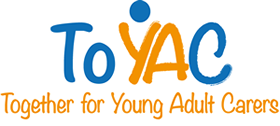In the last 20 years the European Union has given significant attention to informal/family carers’ issues. In many countries this focus has led to significant levels of research, policy formation and the development of evidenced based interventions including income support. Other countries are only at the beginning of this journey. Young adult carers (YAC) are very poorly represented in policy and service development.
Apart from some countries (such as the UK and Ireland) the majority of European countries have no reliable figures on the number and characteristics of young carers; few research and policy papers; limited if any young carers projects or services; no laws or policies focused specifically on young carers; no ‘rights’ or entitlements; and crucially, very little public or professional awareness or recognition of young carers.
Research and service providers’ experiences tell us that YACs are a minority group but their presence in European families is very common. For instance, there are an estimated 229,318 YACs aged 18-24 in the UK, or 5.3% of that age group. One quarter of all young adult carers in the UK (56,069 people) are providing care for more than 20 hours per week and almost 27,000 of these (12% of the total) are providing care for more than 50 hours each week. Similar prevalence was found in Ireland. These figures suggest that it is very likely that the presence of YACs is as important in the other countries of the ToYAC partnership as it is in the UK or Ireland.
Research has also provided clear evidence that heavy caring responsibilities can compromise equal opportunities in transition to adulthood for young carers. Studies by Dearden and Becker (2000, 2004) highlight the impact of poor school attendance and attainment on young adult carers. Similarly, Yeandle and Buckner (2007) found that “Among young adults aged 16-24 caring reduces the likelihood of being a student and thus participating in further or higher education”. Two reports by young carers projects (Action for Young Carers, 2005; Barnardos, 2007) found that many young adult carers think that their “caring responsibilities will be a barrier” to accessing employment.
In fact, young adult carers often experience the following (Becker 2008):
• Educational problems, due to low attainment and attendance. Some young adult carers have left school or college without the qualifications they would have wished for and they were capable of achieving. This has impacted on them now restricting their opportunities for further education or training as well as affecting their earning potential.
• Barriers to paid work: there is very little ‘spare’ time outside of caring responsibilities to actually go out and find or get a job, or keep it. Moreover, low self-confidence and not having the necessary qualifications impedes young adult carers’ success.
• Limited opportunities, horizons, aspirations: research has shown that a lot of YACs are drawn to local jobs rather than the best jobs for them, or are drawn towards caring-related careers.
• Difficulties in leaving home: one of the biggest challenges for all young adult carers is their ability to leave home as and when they wish. Emotional pressures and demands that some families expect of young adult carers make it especially hard to leave.
• Young carers also face a lack of understanding from peers, restricted friendships and limited opportunities for social and leisure activities. They also often experience emotional difficulties (such as worry, stress, anxiety, depression, anger, upset, resentment), health problems and feelings of exclusion or being ‘outsiders’.
Young carers are, in brief, a group at risk of social exclusion whose educational and employment opportunities are limited by the role they play in the family. The lack of awareness, attention and research on their situation, makes it difficult for public and voluntary organisations to develop suitable strategies and services.
ToYAC is an opportunity to share experiences and good practices between countries. Those with considerable experience in the area (such as the UK and Holland) will have the chance to demonstrate what is possible, while those with less experience (Italy, Ireland, Germany) can capitalise the work done in other countries, build on successful experiences, help in raising awareness and clear the way for the piloting of new services and studies.


